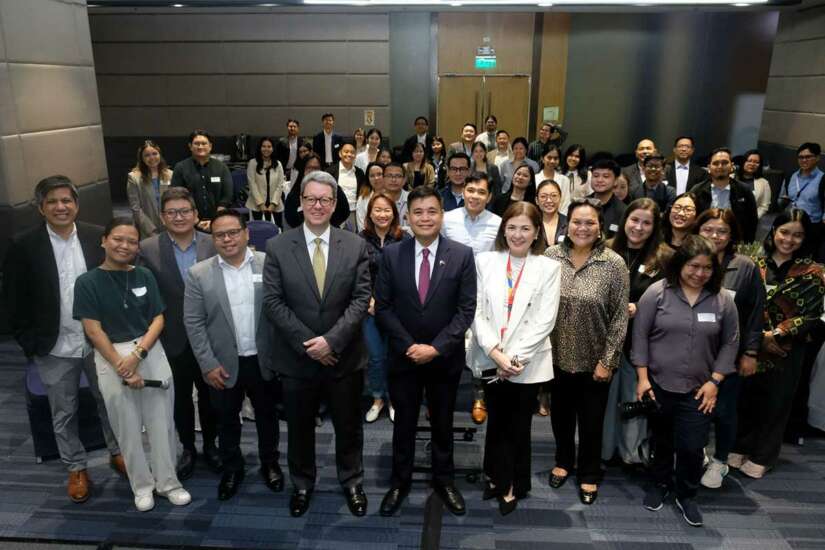The Philippine government, the private sector, and investors are of one mind in addressing the problems caused by climate change. During the 4th Carbon PH Coalition learning series last April 11, the country’s top corporations and officials from the Philippine Climate Change Commission gathered to discuss the ongoing climate change challenges faced by the country and mitigation measures using nature-based solutions. The government has stated in the meeting that they have already laid the policy groundwork for decarbonization, while private sector leaders confirmed that investors are ready to finance green projects.
The Philippines’ Groundwork for Adaptation
Both the government and the private sector must work together in a collective effort to achieve the country’s climate goals, according to Philippine Climate Change Commission Secretary Robert E.A Borje. He attended as the keynote speaker of the session, outlining the current threats that the country faces from climate change and the steps that have already been taken by the Marcos Jr. administration in response. He highlighted the effects of climate change in the country such as increased intensity of typhoons, which has cost the country P673.30 billion just from 2011-2021.
“Climate change intersects with various social, economic, and ecosystem challenges, exacerbating issues such as poverty, inequality, and biodiversity loss. Businesses face disruptions in operations, supply chains, and increased costs due to disasters, ultimately leading to economic instability and job loss,” Sec. Borje said. He added that the government requires a ‘whole-of-society’ approach, and that collaborating with the private sector, academe, and communities, among others, is essential.
Sec. Borje explained that the government has already laid the policy groundwork for decarbonization. To this end, the country has aligned with various international frameworks and agreements such as the United Nations Framework Convention on Climate Change, the Kyoto Protocol, the Sendai Framework, the Paris Agreement, and the 2030 Agenda for Sustainable Development.
The government has also created guiding documents such as the National Framework Strategy on Climate Change (NFSCC), National Climate Change Action Plan (NCCAP), and the National Adaptation Plan (NAP) which identify priority climate investments and guidance for businesses to climate-proof their operations. Meanwhile, the People’s Survival Fund Act serves as financial support for local climate change adaptation projects and encourages the private sector to invest in low-carbon and sustainable practices.
“Government policies, together with private sector investments, can pave the path for stronger climate action,” Borje said.
Investors are ready to fund sustainability projects
As a complement to Sec. Borje’s call for a holistic approach to finding climate solutions, SM Investments Corporation (SMIC) Consultant and Head of Investor Relations and Sustainability Timothy Daniels said that investors and fund managers around the world are increasingly considering sustainable project financing as a priority. Daniels joined the learning session as the second key speaker, bringing with him his experience with SMIC’s own sustainability projects and the financing required for them.
“Today, sustainable investing is a consideration, I would say, in almost all equity investments. And it is a very large opportunity,” Daniels said.
Daniels reported that as of 2020, Bloomberg estimated that there was as much as USD 30 trillion of assets allotted for specific ESG (Environmental, Social, Governance) investing administered by fund managers globally. By the end of the decade, that number is predicted to grow to as much as USD 40 trillion. He added that many fund and investment managers have sustainable projects, including ESG, at the top of mind when choosing which companies to partner with, and that they consider ESG efforts as an indicator of a company’s health and viability.
SMIC invests heavily in green projects. Its portfolio of office buildings under Neo, in Bonifacio Global City, have achieved carbon net zero, its first commercial portfolio certified under the International Finance Corporation (IFC) EDGE program. They also have investments in geothermal energy, one of the most reliable renewable energy sources, including geothermal steam production facilities through Philippine Geothermal Production Company that enables its partner, AP Renewables, Inc., to produce 300MW of clean energy.
“There are investors who choose sustainability because they believe that sustainable companies are just better companies. Sustainable companies over the long term are just better run, more reliable, they are less risky, and they are more profitable. This is a belief that is widely held,” Daniels said.
The Aboitiz Group has acted as the de facto secretariat of the Carbon PH Coalition, which holds regular learning sessions to create a platform for companies to share best practices and gather diverse views from different stakeholders as they conduct their respective sustainability drives.
“The idea of these meetings was to bring together like-minded companies, organizations, and individuals that have heavily invested in, and or, are heavily investing further into nature-based solutions, that can deliver meaningful impact in solving climate change,” said Aboitiz Equity Ventures Chief Reputation and Sustainability Officer Ginggay Hontiveros-Malvar.
About Aboitiz Equity Ventures
AEV is one of the leading conglomerates in the Philippines with over 100 years of business history. It has major investments in power, banking and financial services, food, infrastructure, land, and data science and artificial intelligence. AEV is recognized as one of the best-managed companies in the Philippines and the region, consistently cited for its commitment to good corporate governance and sustainability. Currently, the company is on its Great Transformation journey to become the Philippines’ first Techglomerate as it continues to shape the future by advancing business and communities.
AEV is a member of the United Nations Global Compact, Global Compact Network Philippines Board of Trustees, the APEC Business Advisory Council and the Council for Inclusive Capitalism, and helps champion sustainability initiatives on a regional level through policies, advocacies, and initiatives that contribute to the United Nations Sustainable Development Goals (UN SDGs). With a clear focus on ESG, the company is implementing its #OneAboitizSustainability Synergy model which transforms its life-essential businesses to improve sustainable practices and continue to create a positive impact on society and the environment.
Link to AEV’s website and release: https://aboitiz.com/investor-relations/disclosure/

